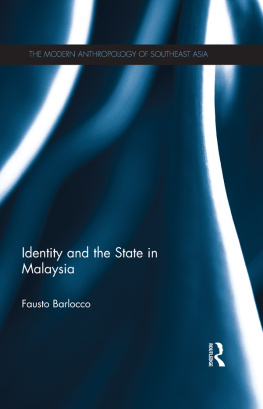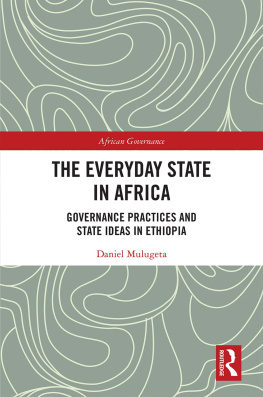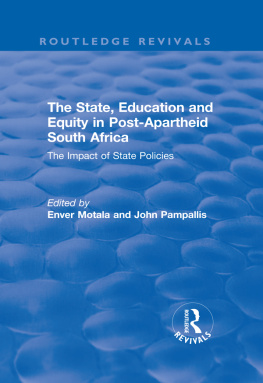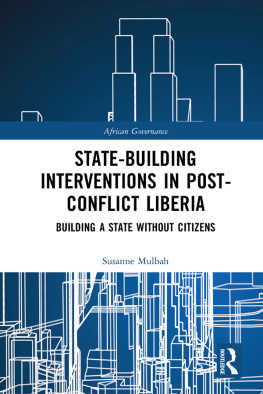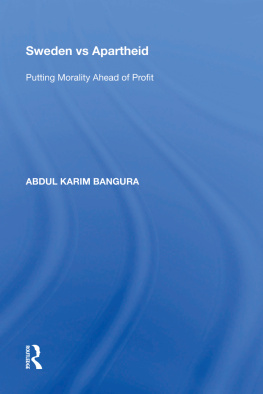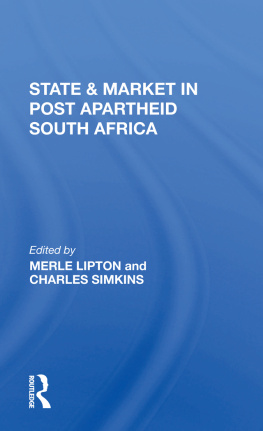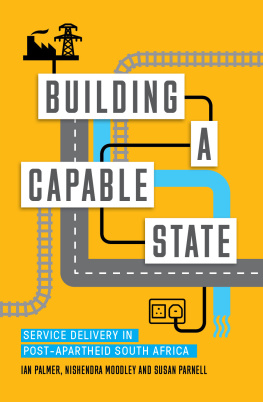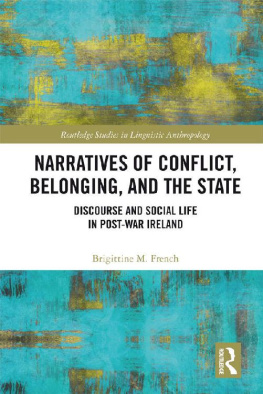Published in 2011 by
Berghahn Books
www.berghahnbooks.com
2011, 2014 John T. Friedman
First paperback edition published in 2014
All rights reserved. Except for the quotation of short passages
for the purposes of criticism and review, no part of this book
may be reproduced in any form or by any means, electronic or
mechanical, including photocopying, recording, or any information
storage and retrieval system now known or to be invented,
without written permission of the publisher.
Library of Congress Cataloging-in-Publication Data
Friedman, John T.
Imagining the post-apartheid state : an ethnographic account of Namibia / John T. Friedman.
p. cm.
Includes bibliographical references and index.
ISBN 978-0-85745-090-6 (hardback) ISBN 978-0-85745-091-3 (institutional ebook) ISBN 978-1-78238-323-9 (paperback)
ISBN 978-1-78238-324-6 (retail ebook)
1. EthnologyNamibia. 2. Political anthropologyNamibia. 3. Kaokoland (Namibia)Politics and government. I. Title.
GN657.N35F75 2011
305.80096881dc22
2011006254
British Library Cataloguing in Publication Data
A catalogue record for this book is available from the British Library
ISBN: 978-1-78238-323-9 paperback
ISBN: 978-1-78238-324-6 retail ebook
ACKNOWLEDGEMENTS
They say that one never really finishes writing a book; instead, one just stops. After many years, perhaps too many, I have finally decided to stop writing this book.
My affair with the Namibian State began in the early 1990s. Since then, I have come to know so many lovely people, many of whom gave of themselves in ways that can in no way be matched by a mere acknowledgement such as this. Although they have given me knowledge and support, and ultimately made it possible for me to start and then stop writing this book, it is actually their gift of friendship that I value most of all.
I owe my gratitude to the many Kaokoland-connected people who shared their ideas, time, knowledge and space, and who assisted me during my stays in Opuwo and Windhoek. In particular, I would like to thank Jennifer Chin, Maja and Ted Essebaggers, Ingenecia Humu, Kenneth Humu, Kahorere Hungi, Kapandu Kashango, Jekura Kavari, Tjiuree Kazavanga, Uripoye Mburura, Nici Muhenje, Inimgirua Musaso, Karumia Musaso, Kiana Nelson, Uvatera Venane Ngombe, Eberhard Rothfuss, Lucresia Ruiter, Johannes Ruiter, Jacob Schoeman, Sophie Shipepe, Tjikajona Siraha, Kapuka Thom, Uziruapi Tjavara, Ursula and Pieter de Villiers, and the staff at the Opuwo Magistrates Court. Three Kaokoland-connected individuals deserve a special acknowledgement: Uhangatenua Kapi was the most ideal research assistant imaginable, and his contribution to this study, though unfairly hidden, was highly significant; as for Mike Kavekotora, he was the most ideal informant imaginable, and his tireless willingness to convey his knowledge was only limited by my ability to comprehend; and, finally, Aparicio Chinho Lopes was the most ideal spirit imaginable, and like such special and rare people, he has never quite realised his own contribution in making Opuwo so memorable and meaningful.
During the past eighteen years, my relationship with Nick Mkabelana, Raya Tjieva, and the rest of the family and neighbours in Gemengde Een (Windhoek) has anchored me in Namibia like no other. They have always made the country feel like a home to me. A number of other Namibia-connected people have also gone to great lengths to assist me. I am grateful to the staff at the National Library and the National Archives, particularly Kenny Husselmann and Teresa de Klerk. Ben Kasetura was a fantastic language teacher; Jon Barnes and Beth Terry opened their home first as strangers, and then continually throughout the many stays thereafter as friends; and Evelyn Shilamba has given me the gift of her friendship since those early days at the ministry. In addition, I would also like to extend my appreciation to Michael Bollig, Joshua Forrest, Robert Gordon, Franz Irlich, Mary Isaacs, Nixon Marcus, Naff Mieze, Abe Naude, Svein rsnes, Elrich Pretorius, Paulina Shivute, David Simon, Jacqueline Solway (who is almost connected to Namibia), Ciefriedine Tjeriko, Alet Witbeen and Steven van Wolputte.
My years affiliated with the Department of Social Anthropology at the University of Cambridge left an indelible mark on both me and this book. I feel most fortunate for having had the privilege of working closely with the late Sue Benson. Despite her most untimely death, she continues to shape me as a teacher, researcher and writer. In addition, a number of other Cambridge-connected individuals have inspired, encouraged and/or supported me throughout the course of this project. Many of them have read and commented on draft chapters or earlier incarnations of the book. I would thus also like to extend a sincere thank you to Anthony Baylis, Robert Edgar, Mariane Ferme, Wenzel Geissler, Thomas Blom Hansen, Keith Hart, Leo Howe, John Iliffe, John Lonsdale, Alan Macfarlane, Hayley Macgregor, Nolwazi Mkhwanazi, Ruth Prince, Todd Sanders, Fiona Scorgie, Nikolai Ssorin-Chaikov, Julie Taylor, Marilyn Strathern and Lucy Ward.
A group of Netherlands-connected people have also assisted me during the course of this project. Peter Geschiere has been both an inspiration and a constructive critic; I have appreciated his willingness to engage my work, and I have benefited greatly from his feedback. Mart-Jan de Jong insisted that I persevere, and he enabled that by winning valuable (and very hard to come by) writing and research time for me. Pieter Ippel has supported me in ways that extend well beyond the confines of this project, and for that I am most grateful. I also wish to thank Arno Coppens, Isperih Karaivanov, Liesbet Mallekoote and Peter Slager, as well as the many Roosevelt Academy (Utrecht University) students who have sparked my thinking while participating so enthusiastically in my Faces of the State seminar.


